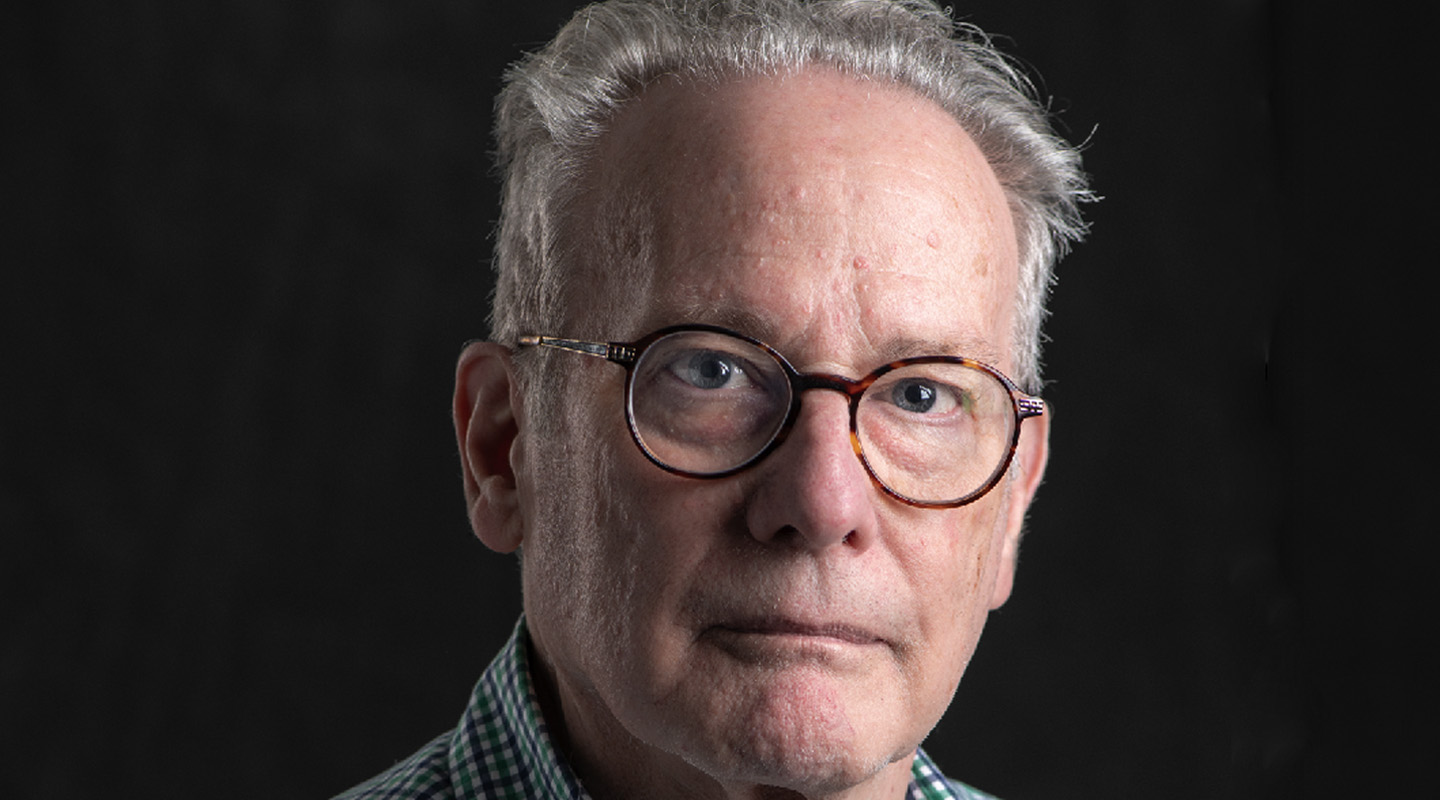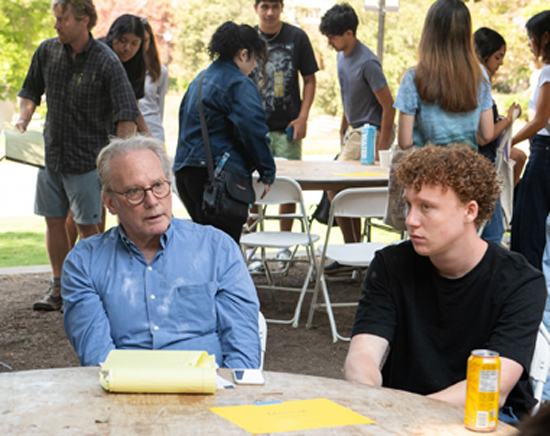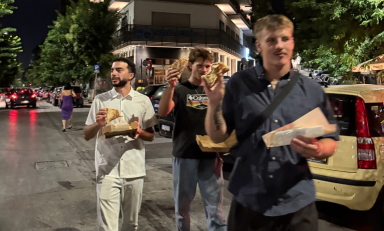
Whether it was 18th-century British literature or 20th-century European critical theory, Montag approached the syllabus with rigor, grace, warmth, and plenty of deadpan humor—and he supported his students unceasingly
As a student at Palisades High School in 1969, Warren Montag participated in a walkout to protest the Vietnam War. “I wasn't consistently politically active at that time, but looking back, I would say that was an important experience,” he says. After the walkout, he and his classmates went to a demonstration at UCLA—and while they were on campus, “The police attacked the demonstration. I had to run through UCLA, which was like a baptism of fire. It was scary but good.”

That seminal encounter set the stage for a lifetime of political engagement. “I’m an activist from way, way back,” says Montag, who retired this spring as the Louis M. Brown Family Professor in Literature in English at Occidental. “I have faced all sorts of things.”
That engagement only deepened when he arrived as a freshman at UC Berkeley in the fall of 1970. “There were all kinds of crazy things going on,” he recalls. This environment spurred his intellectual and political development. “I became more politicized, not just in practice but in reading Marx and all the other stuff, figuring out what my politics were.”
At the same time, Montag’s professional journey was coming into focus. From an early age, he says, “I was interested in writing. I had some vague idea that I’d be a novelist. But when I went to Berkeley, being a college professor seemed like a pathway to a job.”
Montag stepped into an adjunct role at Oxy in 1982 when there was a sudden vacancy in the English Department. “It wasn’t exactly my area of specialization”—namely, History of the English Language—“but at that time it was very difficult to get jobs. So I took it and did my homework. I didn’t do a bad job.”
In 1987, the unexpected death of Professor Donald Adams two days before the start of the term left Occidental with an opening in the English Department. “They had five classes and they didn’t have someone to teach them, so the department chair [David James] offered me the job because I could basically cover them,” Montag says. “I’ve been here ever since.”
From the beginning, Montag says he felt “very comfortable” in the classroom. “I like teaching—it’s like a performance. I have the sort of stand-up comedian tendencies, which the students can tell you about.” (And his colleagues as well: In his recruitment pitch to a prospective faculty member, English Department Chair and Associate Professor Ross Lerner described Montag “as the love child of Larry David and Leon Trotsky.”)
When asked if he has a favorite course, he demurs: “With very few exceptions, I’ve enjoyed all of the courses that I’ve taught. I’ve done a lot of survey courses covering a broad period of time, especially recently. I try to vary the poems and novels that I’m reading, and I enjoy analyzing them. It’s not repetitive to me because every time I read something, I have a different interpretation. Even teaching those courses ends up being very stimulating for my own work and writing.”
“Warren set the tone for the English Department that exists today,” says Kristi Upson-Saia, the David B. and Mary H. Gamble Professor of Religious Studies and associate dean for faculty affairs. “The intellectually rigorous reputation of the English department is due in large part to his influence.”
Quoting Lerner again: “His scholarly range has moved across medieval Jewish theology to 17th-century philosophy, from Renaissance political theory to Spanish Golden Age poetry; from the rise of the novel in 18th-century England to the political, economic, and literary influences of Adam Smith; from early 20th-century literary and political internationalism to French Marxism to Latin American social movements. It’s just so expansive. It’s really incredible.”
Even as a high school student, Montag demonstrated an astonishing facility with language. “I was interested in French poetry for whatever reason—it’s a long, complicated story—but I became very close to a group of philosophers and people who also wrote literature in France,” he explains. “In France, unlike the United States, they expect that if you write about a text, you have to note in the original language, so I just picked up the imperative that you have to know the language.”
How many languages does he know? “My wife and I speak Spanish to her parents,” he says, “and Spanish and French are very close. I’ve translated from Italian but I don’t speak it well. I had to learn Portuguese for various things that I was working on. When I was finishing my Ph.D., I learned Greek and then Latin as part of my work. I was reading Greek philosophy when I became interested in the philosopher Spinoza, who also wrote in Latin.” (OK, we lost count, but the most recent language he learned is biblical Hebrew.)
To know Montag is to have an opinion about him. In speaking up and organizing for issues he believes in, Lerner said at the retiring faculty reception, “This has occasionally made him a controversial figure on campus. He has had the rare honor of provoking not just one but two faculty members to write and circulate impressively lengthy poems denouncing him on the faculty listserv,” he noted to laughter. “But Warren has always, in his scholarship and his organizing, been committed unwaveringly to a vision of a more just world, which he has argued can only be constructed by the slow and painstaking building of capacities for mass movements.”
More than a decade ago, Montag was approached by members of the Oxy chapter of Students for Justice in Palestine (SJP)—the national advocacy group founded at UC Berkeley in 1993—to be their new adviser after his predecessor in the role had left the College. “They put on all these educational events, and I was extremely impressed by their intelligence and knowledge,” he says. “Seeing students’ commitment to social justice has been a huge part of Oxy for me.”
In an unofficial capacity, he adds, “Jewish students who are not pro-Israel have worked with me for years.” Last fall, a group of students approached him with a request to teach them Yiddish as an independent study course. Working from a textbook titled College Yiddish, “We met once a week for a couple of hours,” Montag says. “They were very quick learners and really got into it—they wanted to do research on various Yiddish-language publications in the United States.”
Whether it’s sharing his daily poetry translations in the printer room in Swan Hall or tracking down an obscure essay for a colleague—and then translating it into English—Montag shares his love for language and literature with his colleagues. That benevolence extends to his students exponentially: At a retirement symposium in May, nine of Montag’s former students shared stories about how he helped shape their intellectual and political lives while at Oxy, and has remained committed to them since graduating.
“I did not expect that the entire audience would be moved to tears,” Lerner said. “Warren taught these students how to read, write, and think in completely new and transformative ways. He supported their intellectual and personal development with stunning generosity.”
Montag’s ties to Occidental extend beyond the classroom. He is married to Dolores Trevizo ’88, the Madeline N. McKinnie Professor of Sociology and department chair and a member of the Oxy faculty since 1998. They are the parents of Jacob Trevizo Montag ’20, a politics major who recently enrolled in UCLA’s Master of Urban and Regional Planning program.
What are his plans for retirement? “Just writing,” Montag says—his bibliography includes five scholarly monographs, numerous edited volumes, and countless articles and translations. “I’m working on a couple of books—one is just about finished, the other is about half-finished.” He’s also writing an introduction for a book of collected essays and has a number of conferences and papers on his calendar (having recently returned from a symposium in Brazil). “So I will continue to be active in a scholarly sense,” he says.
And politically? You know the answer to that one. “I’ll probably be active in some way as well,” Montag says. “I’m a political animal.”
Lynn Ta: I don’t think it’s hyperbole to say that Warren Montag played a significant role in my life’s direction. I was Warren’s student over two decades ago and during the course of my four years at Oxy, he became a friend and mentor to me. I took several classes with him and he ultimately became my adviser for my honors thesis on Michel Foucault.
In class, Warren opened my eyes to the rich and deeply profound world of critical theory. Marx, Foucault, Althusser, Spinoza, Fanon: They were portals to a mode of analysis that did not take anything as a given. And Warren, in turn, was my portal to them.
I remember first reading Althusser’s “Ideology and Ideological State Apparatuses” and Foucault’s Discipline and Punish in Warren’s class, Literature and Philosophy. It was a revelation. These texts inverted and subverted so many of the dominant paradigms that I could up until then, only intuit to be deceptive fallacies. The materialism of Althusser and Foucault (and Marx and Spinoza) asked piercing questions about freedom and servitude, traversing concepts that were at once provocative and unsparing: Subjectivization as a form of subjection. Free will as a fabulous ruse. Our bodies held captive by the internalized authority of our minds.
As a teacher, Warren was unsurpassed. With his immense intellect, he demanded the same level of rigor from his students, but he also imparted his knowledge, wisdom, and insight with grace, warmth, and plenty of deadpan humor. He has supported his students unceasingly, whether it was an undergraduate conference presentation, a Gaza solidarity encampment, or even just hard things we were going through.
After college, under Warren’s guidance, I started a doctorate program in literature, but I found that the ivory tower made me restless and did not have the kind of real-world impact that I was seeking. I eventually left academia, trading in literature for litigation. I am now a labor lawyer, with a side hustle in criminal defense. In these spaces, it’s hard to escape the foundational ideas that I learned from Warren. In the criminal courtroom, how have Black and brown bodies been targeted for surveillance and interpellated as culpable subjects within a system that has already determined their criminality? At worksites, how have laboring bodies been disciplined for optimal docility and maximum utility? What does resistance and revolution look like when our bodies have been committed to subjugation? How, indeed, do we get free?
I had learned so much theory from Warren, but it wasn’t until recently that I learned about his praxis. In a guest lecture I attended, Warren shared about his experience with labor organizing, including his time organizing with Justice for Janitors. Ever the sage, Warren reminded us that in the struggle to transcend our domination, showing up, day in and day out, to do the often prosaic, unglamorous work of the movement can form the bedrock of our most sweeping victories.
And perhaps, this is the enduring lesson of our beloved Professor Montag: Just as he has done for his students, for his community, and for the movement, we have to keep showing up, for ourselves, and for each other. It is the only path to our collective liberation.
An English and comparative literary studies major at Oxy, Lynn Ta has been a field attorney with the National Labor Relations Board since 2017.



